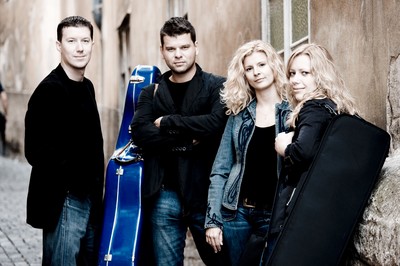UMS introducing Pavel Haas Quartet to Ann Arbor on first American tour

The Pavel Haas Quartet
photo by Marco Borggreve
That’s the case, it would seem, with the Pavel Haas Quartet, which makes its UMS debut Wednesday evening at Rackham Auditorium.
If you’ve never heard of this Czech quartet, or the Czech composer for whom it’s named, it’s no surprise.
The quartet, formed in 2002, has been gathering steam—and garnering great reviews—on the European circuit. Its first major U.S. tour—which includes Carnegie Hall as well as Ann Arbor—comes on the heels of a 2011 Gramophone award for “Recording of the Year” that put the group in the same league as previous winners like Claudio Abbado, Krystian Zimerman, Maxim Vengerov and Sir Simon Rattle. The award was for their recording of Dvořák’s String Quartets Op.106 and Op.96, “American.” Following the recording’s release in 2010, it received unanimous critical acclaim, with The Times of London commenting that "Their account of the American Quartet belongs alongside the greatest performances on disc. In this repertoire, they are simply matchless today."
You can give a listen to some of the “American” online at www.intermusica.co.uk/pavelhaasquartet, but at Rackham on Wednesday, it’s not on the bill.
On the other hand, music by Haas, the composer whose name the quartet chose, is on the bill, along with Smetana’s Quartet No. 1 in e minor (“From My Life”) and Tchaikovsky’s Quartet No. 1 in D Major.
PREVIEW
Pavel Haas Quartet
- Who: Chamber-music ensemble.
- What: Music of Tchaikovsky, Smetana and Haas.
- Where: Rackham Auditorium, 915 E. Washington St.
- When: Wednesday, 7:30 p.m.
- How much: $20-$42. Tickets available from the UMS Michigan League Ticket Office, 734-764-2538, and online at ums.org.
Among his output are three string quartets, from 1920, 1925 and 1937-38. It is the second of these, titled “From the Monkey Mountains” (Moravian Highlands popular with tourists), that figures on Wednesday’s program, though the four members of the Pavel Haas Quartet have recorded all three.
The second quartet’s four movements, like the quartet itself, bear descriptive titles, and the music is both evocative and unusual: in addition to the quartet forces, Haas included percussion into the work’s final movement. His innovation was not well received, and he subsequently removed percussion from the piece. But a number of modern performaners have reinstated it. That’s the case with the Pavel Hass Quartet, and Wednesday’s performance features a a performer familiar to local audiences, perucssionist Joseph Gramley, a member of the University of Michigan School of Music faculty.
Preview the Haas second quartet, if you like, on the Intermusica website; but this sounds like a concert that one will want to hear up close and personal to get acquainted with this European quartet on the rise.

